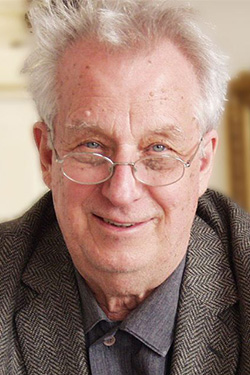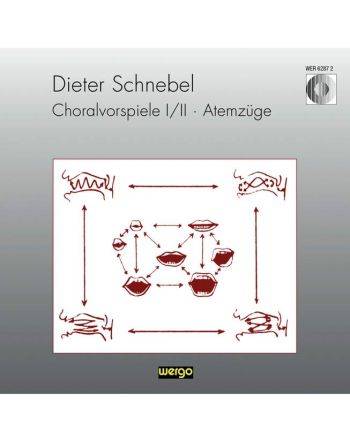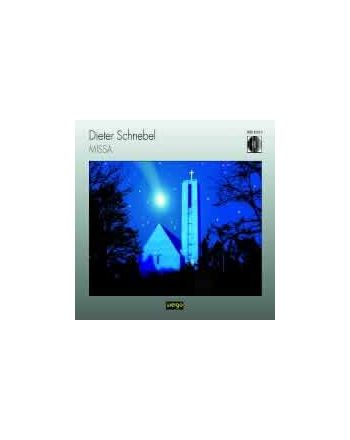
Dieter Schnebel
About Dieter Schnebel
When time becomes an instant, it is transformed into space. Every spatial construction and each spatial distance is temporal: a temporal unit in which time is consolidated. (Dieter Schnebel)
Dieter Schnebel was born in Lahr/Baden on 14 March 1930. He began his studies at the Musikhochschule in Freiburg in 1949, simultaneously attending lectures given by Martin Heidegger at the University of Freiburg, and forged close contacts with the Kranichsteiner (now Darmstadt) Summer Courses for New Music (Adorno, Varèse, Messiaen, Nono, Stockhausen and later Cage). Schnebel then studied Protestant Theology (Karl Barth, Rudolf Bultmann), Philosophy (including the works of Ernst Bloch) and Musicology (Walter Gerstenberg, doctoral thesis on dynamics in the music of Schoenberg) in Tübingen from1952 to 1956. He was subsequently employed as a teacher and pastor in Kaiserslautern, Frankfurt/Main and Munich. A position as professor for experimental music and musicology was specially created for Schnebel at the Hochschule der Künste in Berlin in 1976, a post he occupied until becoming professor emeritus in 1995. He continued his theological activities as a preacher at the Johann-Sebastian-Bach church in Berlin-Lichterfelde and the church of St.Anne in Berlin-Dahlem. He wrote numerous musicological essays and books on subjects ranging from Bach, Beethoven, Schubert, Schumann, Wagner, Mahler and Debussy to Cage and Kagel.
Schnebel was originally a strict serial composer: Stücke für Streichinstrumente (1954/55), dt 31,6 (1956-58) and Compositio (1955/56), before an increasing anti-dogmatism spurred him on to develop experimental concept and process composition methods: Glossolalie 61Das Urteil (1959/60), (based on Kafka, 1959) and Ki-No (1963/67) in which he exploits the use of the human voice in previously unknown dimensions ranging from whispering and wheezing to screaming. He also produced compositions of a sacred character (Für Stimmen (…missa est) (1956-69), Dahlemer Messe (1984/87), Magnificat (1996/97) and missa brevis (2000-02), arrangements of Bach chorales and organ works), including works for the church pavilion at the EXPO 2000 and the documenta 2001. Through the creation of the theatre group "Die Maulwerker" at the Berlin Hochschule der Künste, Schnebel was able to systematise his open work concept which was only partially based on “fluxus” (réactions 1960/61, visible music 1960/62 and anschläge-ausschläge 1965/66) in which the musicians were instructed to participate in spatial actions involving the unconventional utilisation of their instruments and voices (Harley-Davidson for 9 motorbikes and trumpet 2000, Flipper for slot machine, performers, instruments and tape recorder 2002/03).
Each of the following work cycles originated in compositional processes over a period of several years: Maulwerke, Körper-Sprache, Schulmusik, Laut-Gesten-Laute, Museumsstücke, Schau-Stücke and Bachmann-Gedichte. In the cycles Re-Visionen (1972-92) and Tradition (1975-95) and also in the chamber music series Psycho-Logia (incl. Pan 1978/88 and Medusa 1989/93) with its references to Greek mythology, the composer developed innovative concepts in the relationship between traditional and new or experimental music. The opera Majakowskis Tod - Totentanz (1989/97), the large-scale vocal work Ekstasis (1996/97/2001) and the monumental Sinfonie X (1987/92/2004) can be counted among Schnebel’s key works.
In 1991, Schnebel was awarded the Lahr Culture Prize and was the first recipient of the European Church Music Prize awarded by the town of Schwäbisch Gmünd in 1999. He is a member of the Academy of Arts in Berlin, the Free Academy of Arts in Leipzig (both since 1991) and the Bavarian Academy of Fine Arts (since 1996).
Worklist
Chronology
"Museumsstücke I ", "MoMA, Museumsstücke II" für bewegliche Stimmen und Instrumente, "Numbers" für einen Vokalisten, "Schau-Stücke" Körperetüden für Stimme und Gesten, "Worte-Töne-Schritte" Musikalische Story für Stimme, Sythesizer und Schlageug
Vokalmusik:
"Motetus I" für zwei Chöre, "Lamento du Guerra" für Stimme und Orgel, "Amazones" für fünf Frauenstimmen, "Kaschnitz-Gedichte" für Stimme und Klavier, "Quintessenz" für Vokalquartett mit Klavier, "Mit diesen Händen" für Stimme und Violoncello
Instrumentalmusik:
"Toccata mit Fugen" für große Orgel und Schlagzeug, "Lamah" für Streichtrio mit Stimme
Herzinfarkt-Bypassoperation
"Motetus II", "Magnificat" für Schola, Chor und Schlagzeug, "Missa brevis", Psalm 139" für Stimme und Schlagzeug, "Aschermittwochsmusik" für Schola, Chor, Orgel und Schlagzeug, "David-Projekt"
"Y2K" (zum 1.1.2000) für Stimmen, "Harley-Davidson" für 9 Motorräder und Trompete, "N.N." für bewegliche Stimmen und Instrumente, "Flipper" für Spielautomaten, Stimmen, Darsteller, Instrumente und Tonband, "Fontana-Mix-Musik" für 2 Darsteller, 2 Instrumente und Tonband, "Zimzum-Musik" Projekt für Streichtrio, Stimme, Synthesizer und Projektion
Weitere Kammermusik:
"Verschattungen" für Bassklarinette, Viola und Tonband, "Anfänge..." für Gitarre (Saxophon, Schlagzeug ad lib.), "Bachmann-Gedichte" für Stimme, Saxophon und Schlagzeug
Products
-
for choir (and organ or synthesizer ad lib.)Composer: Dieter SchnebelEdition: Choral scoreSeries: Schott Chamber Choir
Brand: Schott Music
Instrumentation: choir a cappellaProduct number: SKR 20069Product TypeAs low as £9.50 -
Bachmann Poems IIComposer: Dieter SchnebelEdition: PartiturSeries: Edition Schott
Brand: Schott Music
Instrumentation: female voice, clarinet or saxophone, violin, cello, piano and percussionProduct number: ED 20911Product TypeAs low as £39.99 -
"in space"Composer: Dieter SchnebelEdition: Score and partsSeries: Edition Schott
Brand: Schott Music
Instrumentation: string quartetProduct number: ED 20297Product TypeAs low as £40.99 -
Textfragmente aus "Penthesilea"Composer: Dieter SchnebelEdition: Choral scoreSeries: Schott Chamber Choir
Brand: Schott Music
Instrumentation: female choir (SSMezAA)Product number: SKR 20038Product TypeAs low as £9.50 -
Anregungen I,2 (aus Schulmusik)Composer: Dieter SchnebelMedia Type: E-score PDFSeries: Workshop
Brand: Schott Music
Instrumentation: 5–12 player (wind instruments, strings or gemischtEb ensemble)Product number: WKS 45 Q42345£6.99available for download immediately -
(Modelle No. 5) Szenische Variationen für 3 InstrumentalistenComposer: Dieter SchnebelMedia Type: Sheet musicEdition: Performing scoreBrand: Schott Music
Instrumentation: flute, cello and harpsichordProduct number: ED 6641£36.99In stock - usually despatched (or ready for collection) within 1 working day -
Composer: Dieter SchnebelEdition: Vocal and performing scoreSeries: Edition Schott
Brand: Schott Music
Instrumentation: Schola, mixed choir, organ and percussionProduct number: ED 9817Product TypeAs low as £16.50 -
Sechs kleine KlavierstückeComposer: Dieter SchnebelMedia Type: Sheet musicBrand: Schott Music
Instrumentation: pianoProduct number: ED 8248£19.99Not in stock, but can be ordered - usually despatched (or ready for collection) within 7 days -
Contrapunctus XI from "The Art of Fugue"Composer: Johann Sebastian BachArranger: Dieter SchnebelEdition: Choral scoreSeries: Edition Schott
Bach-Contrapuncti
Brand: Schott Music
Instrumentation: 20 Vocalists (5S/5A/5T/5B)Product number: ED 6681Product TypeAs low as £16.50 -
Contrapunctus VI from "The Art of Fugue"Composer: Johann Sebastian BachArranger: Dieter SchnebelEdition: Choral scoreSeries: Edition Schott
Bach-Contrapuncti
Brand: Schott Music
Instrumentation: 20 Vocalists (5S/5A/5T/5B)Product number: ED 6680Product TypeAs low as £20.50 -
Contrapunctus I from "The Art of Fugue"Composer: Johann Sebastian BachArranger: Dieter SchnebelEdition: Choral scoreSeries: Edition Schott
Bach-Contrapuncti
Brand: Schott Music
Instrumentation: 20 Vocalists (5S/5A/5T/5B)Product number: ED 6420Product TypeAs low as £15.50 -
Composer: Dieter SchnebelSeries: Edition Schott
Brand: Schott Music
Instrumentation: pianoProduct number: ED 7530Product TypeAs low as £14.50 -
for horn and celloComposer: Dieter SchnebelEdition: Performing scoreSeries: Edition Schott
Il Corno
Brand: Schott Music
Instrumentation: horn and celloProduct number: COR 21Product TypeAs low as £11.99 -
Composer: Dieter SchnebelMedia Type: Sheet musicEdition: Study scoreSeries: Music Of Our Time
Canones
Brand: Schott Music
Instrumentation: orchestraProduct number: ED 8835£34.99Not in stock, but can be ordered - usually despatched (or ready for collection) within 7 days -
Composer: Dieter SchnebelInterpreter: Juan Allende-Blin | Guiseppe G. Englert | Carla Henius | William Pearson | Gisela Saur-Kontarsky | Gerd ZacherOrchestra/ensemble: Interpretenensemble DarmstadtConductor: Dieter SchnebelMedia Type: CDBrand: Wergo
Product number: WER 62872£14.99Not in stock, but can be ordered - usually despatched (or ready for collection) within 7 days -
(Modelle No. 3)Composer: Dieter SchnebelMedia Type: Sheet musicEdition: Performing scoreBrand: Schott Music
Instrumentation: 1Pianist (and Audience)Product number: ED 5703£27.50Supplier out of stock, delivery time unknown -
A collection of new pieces for pianoMedia Type: Sheet musicBrand: Schott Music
Instrumentation: pianoLanguage: EnglishProduct number: ED 21470£12.99Not in stock, but can be ordered - usually despatched (or ready for collection) within 7 days -
nach Franz KafkaComposer: Dieter SchnebelMedia Type: E-score PDFSeries: Workshop
Brand: Schott Music
Instrumentation: denatured instruments, natured singing voices, other acoustic sources and audienceLanguage: GermanProduct number: WKS 28 Q42337£16.99available for download immediately -
Lesegänge durch Leben und WerkComposer: Dieter SchnebelAuthor: Gisela NauckMedia Type: BookBrand: Schott Music
Language: GermanProduct number: ED 8479£47.99Not in stock, but can be ordered - usually despatched (or ready for collection) within 7 days -
Film von Peider A. Defilla / Reihe "musica viva – forum der gegenwartsmusik"£25.50Supplier out of stock, delivery time unknown
-
(Räume 4)Composer: Dieter SchnebelMedia Type: E-score PDFSeries: Workshop
Brand: Schott Music
Instrumentation: 3 different ensemblesProduct number: WKS 32 Q42340£4.50available for download immediately -
Composer: Dieter SchnebelSeries: Edition Schott
Brand: Schott Music
Instrumentation: celloProduct number: ED 7748Product TypeAs low as £16.50 -
Composer: Dieter SchnebelMedia Type: Sheet musicEdition: Performing scoreBrand: Schott Music
Instrumentation: violin and pianoProduct number: ED 7988£17.99Not in stock, but can be ordered - usually despatched (or ready for collection) within 7 days -
1. dt 31,6 (Fassung für großen Chor)Composer: Dieter SchnebelEdition: PartiturBrand: Schott Music
Instrumentation: 12 Choir Groups (SSAA/AABB/STB/AATB/SSTT/STTB/SSBB/AAB/AATT/ATTB/SAB/TTBB)Product number: ED 6640Product TypeAs low as £16.99 -
Teil II: amnComposer: Dieter SchnebelEdition: PartiturSeries: Für Stimmen (... missa est)
Brand: Schott Music
Instrumentation: 7 Vocal groups (SAB/AT/ST/TB/AB/AS/STB, Speaking choir)Product number: ED 6456Product TypeAs low as £21.50 -
Teil I: dt 31,6 (Urfassung)Composer: Dieter SchnebelMedia Type: Sheet musicEdition: PartiturSeries: Für Stimmen (... missa est)
Brand: Schott Music
Instrumentation: mixed choir (SSSAAATTTBBB)Product number: ED 6458£21.99Not in stock, but can be ordered - usually despatched (or ready for collection) within 7 days -
Choralvorspiele I/IIComposer: Dieter SchnebelMedia Type: Sheet musicEdition: PartiturSeries: Für Stimmen (... missa est)
Brand: Schott Music
Instrumentation: organ, second instruments and tapeProduct number: ED 6532£20.50Not in stock, but can be ordered - usually despatched (or ready for collection) within 7 days -
(Projekte III)Composer: Dieter SchnebelMedia Type: E-score PDFEdition: Vocal and performing scoreSeries: Workshop
Brand: Schott Music
Instrumentation: 2-4 Speakers and 2-4 InstrumentalistsProduct number: WKS 26 Q45062£15.50available for download immediately -
(Projekte IV)Composer: Dieter SchnebelEdition: Performing scoreBrand: Schott Music
Instrumentation: 3 (4) Speakers and 3 (4) Instrumentalists - conductorProduct number: ED 6414Product TypeAs low as £28.50 -
Ensemble IComposer: Dieter SchnebelMedia Type: E-score PDFSeries: Workshop
Brand: Schott Music
Instrumentation: archaic and exotic instruments (1 wind instruments, 1 strings, 1 percussion)Product number: WKS 30 Q42338£8.50available for download immediately -
für Trompete (Posaune), Synthesizer und 9 MotorräderComposer: Dieter SchnebelMedia Type: E-score PDFSeries: Workshop
Brand: Schott Music
Instrumentation: trumpet (trombone), synthesizers and 9 MotorräderProduct number: WKS 46 Q40267£8.50available for download immediately -
for violin, violoncello and pianoComposer: Dieter SchnebelEdition: Score and partsSeries: Edition Schott
Brand: Schott Music
Instrumentation: piano trioProduct number: ED 20629Product TypeAs low as £18.99 -
for voice and pianoComposer: Dieter SchnebelEdition: Separate editionSeries: Edition Schott
Brand: Schott Music
Instrumentation: voice and pianoProduct number: ED 23062Product TypeAs low as £9.50 -
(Tradition I1) Kanon à 7Composer: Dieter SchnebelMedia Type: E-score PDFEdition: Performing scoreBrand: Schott Music
Instrumentation: 7 equal Instruments (vocal Version: 7 Sopranos and 7 Basses)Product number: ED 6659 Q24018£11.99available for download immediately -
Six Pieces for Piano Trio with VoiceComposer: Dieter SchnebelEdition: Score and partsSeries: Edition Schott
Brand: Schott Music
Instrumentation: violin, cello, piano and voiceProduct number: ED 21262Product TypeAs low as £39.99 -
(Tradition V1)Composer: Dieter SchnebelMedia Type: Sheet musicBrand: Schott Music
Instrumentation: 1 Organist and eventuell 1 AssistentProduct number: ED 8193£27.50Not in stock, but can be ordered - usually despatched (or ready for collection) within 7 days -
Composer: Dieter SchnebelMedia Type: Sheet musicBrand: Schott Music
Instrumentation: voice (alto) and pianoProduct number: ED 8416£22.99Not in stock, but can be ordered - usually despatched (or ready for collection) within 7 days -
Nachtmusik für Projektoren und HörerComposer: Dieter SchnebelMedia Type: E-score PDFEdition: PartiturSeries: Workshop
Brand: Schott Music
Instrumentation: 1 speakers, percussion, tape and 2-4 DiaprojektorenProduct number: WKS 27 Q42331£19.50available for download immediately -
Anregungen I,1 (aus Schulmusik)Composer: Dieter SchnebelMedia Type: E-score PDFSeries: Workshop
Brand: Schott Music
Instrumentation: 3, 5 or 7 InstrumentalistsProduct number: WKS 44 Q42335£6.99available for download immediately -
Composer: Dieter SchnebelEdition: Score and partsSeries: Edition Schott
Brand: Schott Music
Instrumentation: string trio (violin, viola, cello) with voice (medium or high voice) ad libitumProduct number: ED 9205Product TypeAs low as £18.99 -
Composer: Dieter SchnebelSeries: Edition Schott
Brand: Schott Music
Instrumentation: mezzo soprano and organ or synthesizer/accordionProduct number: ED 7994Product TypeAs low as £13.99 -
Weisen von Kopf bis FußComposer: Dieter SchnebelMedia Type: E-score PDFSeries: Workshop
Brand: Schott Music
Instrumentation: 1-4 actorsProduct number: WKS 35 Q42332£13.99available for download immediately -
(Tradition III,3)Composer: Dieter SchnebelMedia Type: E-score PDFSeries: Workshop
Brand: Schott Music
Instrumentation: medium Voice and one Chord Instrument and/or one low Melody InstrumentProduct number: WKS 40 Q42343£14.50available for download immediately -
Improvisation und AusarbeitungComposer: Dieter SchnebelMedia Type: E-score PDFSeries: Workshop
Brand: Schott Music
Instrumentation: shawm and accompanimentProduct number: WKS 41 Q42334£13.99available for download immediately -
for articulatory organs and reproductory equipmentComposer: Dieter SchnebelInterpreter: Michael Hirsch | Ariane Jeßulat | Henrik Kairies | Christian Kesten | Katarina Rasinski | Steffi WeismannStage director: Susanne ElgetiMedia Type: DVDBrand: Wergo
Product number: MV 8045£24.99Not in stock, but can be ordered - usually despatched (or ready for collection) within 7 days -
für Artikulationsorgane und ReproduktionsgeräteComposer: Dieter SchnebelMedia Type: Sheet musicEdition: Partitur, English VersionBrand: Schott Music
Instrumentation: Artikulationsorgane and ReproduktionsgeräteLanguage: EnglishProduct number: ED 7135£51.99Not in stock, but can be ordered - usually despatched (or ready for collection) within 7 days -
für Artikulationsorgane und ReproduktionsgeräteComposer: Dieter SchnebelMedia Type: Sheet musicEdition: PartiturBrand: Schott Music
Instrumentation: Artikulationsorgane and ReproduktionsgeräteLanguage: GermanProduct number: ED 7083£47.99Not in stock, but can be ordered - usually despatched (or ready for collection) within 7 days -
(Psychologia)Composer: Dieter SchnebelMedia Type: Sheet musicBrand: Schott Music
Instrumentation: accordionProduct number: ED 8623£18.99Not in stock, but can be ordered - usually despatched (or ready for collection) within 7 days -
Moralische MeditationComposer: Dieter SchnebelMedia Type: E-score PDFSeries: Workshop
Brand: Schott Music
Instrumentation: Strings, 2 Instruments and PercussionProduct number: WKS 33 Q42460£11.99available for download immediately -
Dahlem MassComposer: Dieter SchnebelInterpreter: Bernhard Gaertner | Marga Schiml | Zsigmond Szathmáry | Christine Whittlesey | Kurt WidmerConductor: Zoltán PeskóChoir: RIAS Kammerchor | Suedfunk-ChorOrchestra/ensemble: Southwest German Radio Symphony OrchestraMedia Type: 2 CDsEdition: 2 CDsBrand: Wergo
Product number: WER 62182£25.99Not in stock, but can be ordered - usually despatched (or ready for collection) within 7 days








































